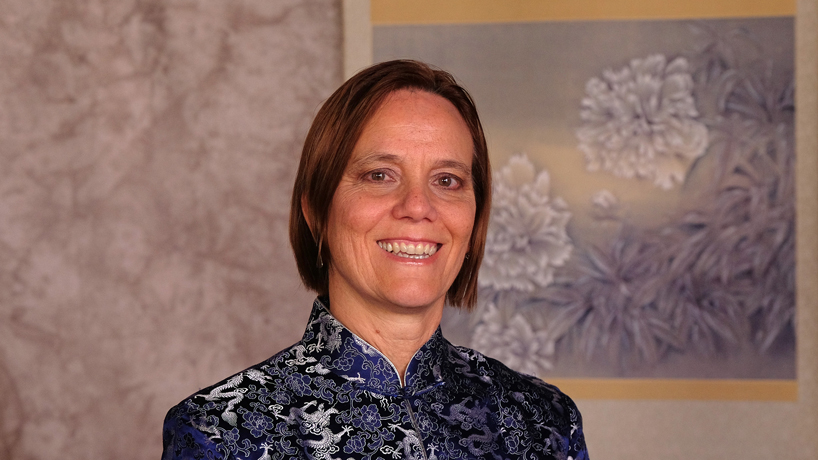
Susan Brownell, a professor of anthropology at the University of Missouri–St. Louis, is an expert on Chinese sport and the Olympic Games. She’s been a sought-after source for news outlets covering the diplomatic situation in the lead-up to the 2022 Olympic Winter Games in Beijing. (Photo by August Jennewein)
Sports fans around the world will train their eyes on Beijing in eight weeks with the start of the 2022 Olympic Winter Games.
There will be no shortage of storylines to follow among the athletes vying for medals and Olympic glory, but it’s the geopolitical drama around the event that is already generating significant attention.
This week, the United States announced it would engage in a diplomatic boycott of the Games. In making the announcement, the White House said that while American athletes would still compete, there would be no official U.S. delegation in attendance because of concerns about China’s human rights record.
The United Kingdom announced it would take similar measures, but many European countries so far are not, including France, Italy and the Netherlands.
Multiple news outlets have turned to Susan Brownell, a professor of anthropology in the Department of History at the University of Missouri–St. Louis, to lend perspective on the situation in the lead up to the Games.
Even before the U.S. announced the diplomatic boycott, Brownell spoke to The Guardian about the International Olympic Committee’s response to the temporary disappearance of Chinese tennis player Peng Shuai after she accused a high-ranking Chinese official of sexual assault last month. The response included a video call between IOC President Thomas Bach and Shaui that drew criticism from activists who suggested the call was a publicity stunt benefitting the Chinese government.
“In the past, the IOC’s sole mission was to ensure that the Games take place whatever the circumstances,” Brownell said. “But this time around, it did get involved in what is essentially a #MeToo case, despite the criticisms that ensued.”
Brownell added: “Thomas Bach could have chosen not to get involved and left it to the International Tennis Federation. But since 2017, when human rights were added into the host city contract, the IOC is beginning to stand up for a wider range of human rights issues than it previously did, although critics will insist on their line that the IOC does not have credibility.”
More recently, Brownell reacted to the U.S. and British diplomatic boycott while speaking to Voice of America Mandarin on Wednesday.
“This is a really critical period right now,” Brownell said. “If a large number of countries jump on board immediately, it really will have much more impact. If it’s only what the Chinese sometimes call the ‘Anglo-Saxon clique,’ if the vast majority of the nearly 100 countries participating don’t follow at all or take a long time to follow, then that will have less impact.”
Brownell has unique perspective on the situation. For starters, she was a nationally ranked track and field athlete in 1980 when the United States engaged in a full-scale boycott of the Summer Games in Moscow in the wake of the Soviet Union’s invasion of Afghanistan in December of 1979.
Earlier this year, Brownell spoke to journalist Tomáš Čorej of the Slovak newspaper Denník about the boycott.
“The boycott showed all the athletes that we were just pawns,” she said told Čorej.
By 1980, Brownell was already studying anthropology as an undergraduate student at the University of Virginia. She went on to earn a PhD in cultural anthropology from the University of California, Santa Barbara in 1990 and has become known internationally for her expertise in Chinese sports and the Olympics.
As a graduate student, Brownell spent a year in studying in China, joining the track team at Beijing University in 1985-86. She represented the university in the 1986 Chinese National College Games and set a national record in the heptathlon. She returned to Beijing Sport University while conducting research for her dissertation in 1987-88.
Brownell is the author of such books as “Training the Body for China: Sports in the Moral Order of the People’s Republic,” “Beijing’s Games: What the Olympics Mean to China” and “The Anthropology of Sport: Bodies, Borders, Biopolitics” and co-edited the book “The Olympics in East Asia: Nationalism, Regionalism, and Globalism on the Center Stage of World Sports.”
Last month, the Associated Press also quoted Brownell in a story about the struggles of the Chinese men’s ice hockey team and the potential for humiliation on the ice this winter. China is ranked No. 32 in the world, and it will be in a group with Canada and the United States, two of the leading medal contenders among the 12 teams competing in the Games.
“If I was a hockey administrator, I’d be shaking in my boots,” Brownell told The Associated Press in a story picked up widely in the United States and beyond. “The criticism really is that you invest all this money, and you can’t produce results.”














